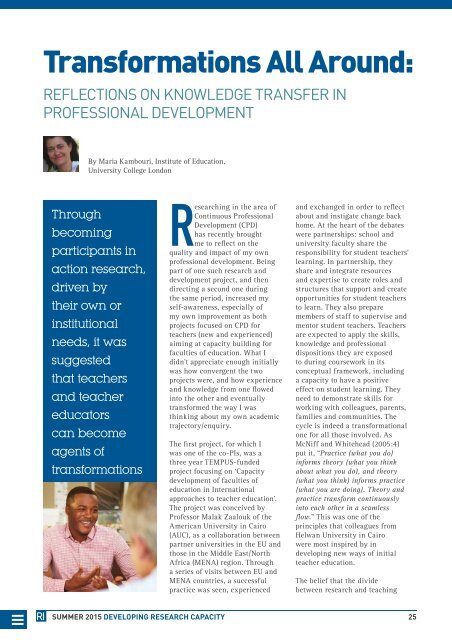CAPACITY
04347-BRA-RI-Magazine-Edition127-Interactive-01-1
04347-BRA-RI-Magazine-Edition127-Interactive-01-1
Create successful ePaper yourself
Turn your PDF publications into a flip-book with our unique Google optimized e-Paper software.
Transformations All Around:<br />
REFLECTIONS ON KNOWLEDGE TRANSFER IN<br />
PROFESSIONAL DEVELOPMENT<br />
By Maria Kambouri, Institute of Education,<br />
University College London<br />
Through<br />
becoming<br />
participants in<br />
action research,<br />
driven by<br />
their own or<br />
institutional<br />
needs, it was<br />
suggested<br />
that teachers<br />
and teacher<br />
educators<br />
can become<br />
agents of<br />
transformations<br />
Researching in the area of<br />
Continuous Professional<br />
Development (CPD)<br />
has recently brought<br />
me to reflect on the<br />
quality and impact of my own<br />
professional development. Being<br />
part of one such research and<br />
development project, and then<br />
directing a second one during<br />
the same period, increased my<br />
self-awareness, especially of<br />
my own improvement as both<br />
projects focused on CPD for<br />
teachers (new and experienced)<br />
aiming at capacity building for<br />
faculties of education. What I<br />
didn’t appreciate enough initially<br />
was how convergent the two<br />
projects were, and how experience<br />
and knowledge from one flowed<br />
into the other and eventually<br />
transformed the way I was<br />
thinking about my own academic<br />
trajectory/enquiry.<br />
The first project, for which I<br />
was one of the co-PIs, was a<br />
three year TEMPUS-funded<br />
project focusing on ‘Capacity<br />
development of faculties of<br />
education in International<br />
approaches to teacher education’.<br />
The project was conceived by<br />
Professor Malak Zaalouk of the<br />
American University in Cairo<br />
(AUC), as a collaboration between<br />
partner universities in the EU and<br />
those in the Middle East/North<br />
Africa (MENA) region. Through<br />
a series of visits between EU and<br />
MENA countries, a successful<br />
practice was seen, experienced<br />
and exchanged in order to reflect<br />
about and instigate change back<br />
home. At the heart of the debates<br />
were partnerships: school and<br />
university faculty share the<br />
responsibility for student teachers’<br />
learning. In partnership, they<br />
share and integrate resources<br />
and expertise to create roles and<br />
structures that support and create<br />
opportunities for student teachers<br />
to learn. They also prepare<br />
members of staff to supervise and<br />
mentor student teachers. Teachers<br />
are expected to apply the skills,<br />
knowledge and professional<br />
dispositions they are exposed<br />
to during coursework in its<br />
conceptual framework, including<br />
a capacity to have a positive<br />
effect on student learning. They<br />
need to demonstrate skills for<br />
working with colleagues, parents,<br />
families and communities. The<br />
cycle is indeed a transformational<br />
one for all those involved. As<br />
McNiff and Whitehead (2005:4)<br />
put it, “Practice (what you do)<br />
informs theory (what you think<br />
about what you do), and theory<br />
(what you think) informs practice<br />
(what you are doing). Theory and<br />
practice transform continuously<br />
into each other in a seamless<br />
flow.” This was one of the<br />
principles that colleagues from<br />
Helwan University in Cairo<br />
were most inspired by in<br />
developing new ways of initial<br />
teacher education.<br />
The belief that the divide<br />
between research and teaching<br />
SUMMER 2015 DEVELOPING RESEARCH <strong>CAPACITY</strong> 25


